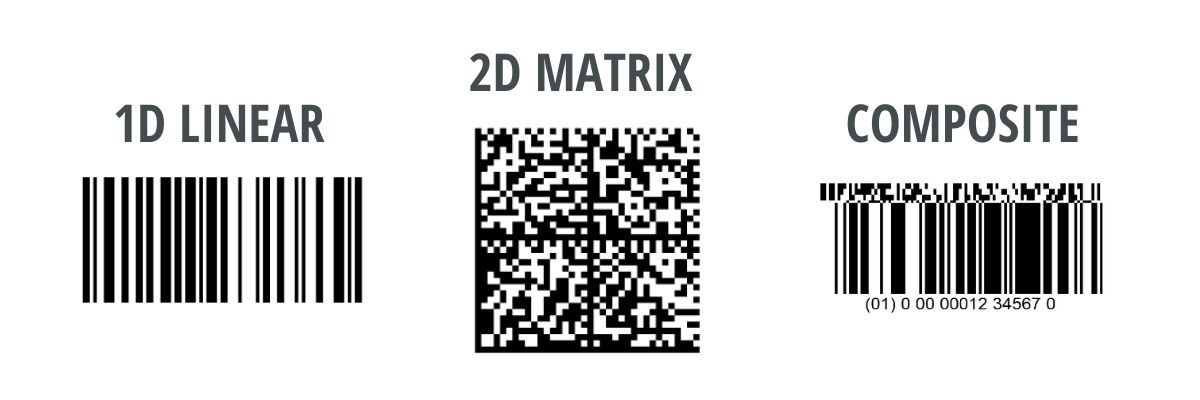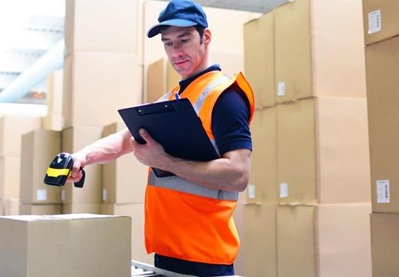सर्वश्रेष्ठ वेबसाइट अनुभव के लिए कृपया अपने स्थान और भाषा का चयन करें

What is a barcode? Merriam Webster says a barcode is “a code consisting of a group of printed and variously patterned bars and spaces and sometimes numerals that is designed to be scanned and read into computer memory and that contains information about the object it labels.” While it’s great to know the technical definition of the word, what does that mean for you and your business?
While there are hundreds of barcode types, they generally fit into one of two categories: 1D linear barcodes or 2D matrix barcodes. The 1D linear barcode is exactly how it sounds, a single line. The 2D matrix barcodes, such as QR codes, can hold more data. There are also composite barcodes that combine a matrix barcode with a linear barcode into one barcode.

Some barcode uses require a human readable component. The human readable component displays the contained data in letters and numbers below the barcode, designed as a fail-safe in case the barcode can't be scanned. An example is shown in the composite barcode above. The bars or patterned spaces are read by the scanner, while humans can read the numbers and letters, if applicable.
Since the invention of the barcode in 1974, its purpose was to hold data to be scanned and read by a computer. There was a need in grocery stores for more efficiency at the check-out line, and the ability for a barcode to hold data like the product name, price, where it was made, and more was essential to achieving this goal. This is when the Universal Product Code (UPC) was first introduced. To this day, the UPC barcode is the most common barcode being used and is printed on many of the products you use every day.

Barcodes were introduced to increase efficiency and speed, and they still serve that purpose today. There are hundreds of kinds of barcodes today that all have a variety of uses for inventory tracking, retail sales, regulatory compliance, data capture, and more. Standards for these barcodes are upheld by GS1, a global standards organization with over two million member companies. GS1 can help determine what kind of barcode(s) you need, whether you need a human readable component, the capacity of the barcode, and more, depending on what the barcode is being scanned for.
The first step to creating a barcode is to know what the barcode is being scanned for. If the barcode is being scanned at a retail point of sale (POS), you need a UPC code. If you are selling online, you’ll need a Global Trade Item Number (GTIN) along with a UPC code. For inventory and warehousing, you’ll need specific barcodes that might encode more information along with the GTIN, like batch/lot number, weight, expiration, etc. Get started by licensing a GS1 Company Prefix or a GS1 US GTIN.
Barcodes truly make the world go around and the supply chain work. The main function hasn’t changed over the years, but they are becoming more widespread and sophisticated, and their uses are never-ending. The main function of the barcode is to increase efficiency by holding essential data and reduce errors that come from manual processes. While technology advances, so does barcoding. The 1D linear barcode will always have a purpose in the supply chain, but we are starting to see more uses of the 2D matrix barcodes and composite barcodes in restaurants for menus or additional advertising on product packaging. This will only continue to increase efficiency, improve the consumer experience with more data, and unlock new barcoding opportunities in multiple industries!
In the dynamic world of barcoding, it’s important not only to have accurate barcodes but to have a true labeling partner that has a long history in the industry, compliant and up-to-date software, and continuous support. The need to barcode better is greater than ever!
If you are new to barcode labeling and not sure where to start, we recommend downloading a 30-day trial of our LABELVIEW software. LABELVIEW is a robust barcode label software that is easy to use, packed with great features and functions, cloud connections, and more!
Click here to learn how to create your first label in LABELVIEW!
Nick Recht is the Sales Manager for the Americas region at TEKLYNX RFID and barcode label solution provider. He leverages his passion for using technology to add value to businesses and his 15 years of AIDC experience to help organizations of all sizes barcode better. When he is not working, he is driving one of his daughters to a practice of some sort or doing a project around the house.
Everyone wants to do better. Whether it’s improving your health, career, or home, there’s always room to do things better. Well, what if I told you there’s a better way to design your barcode labels?
READ MORE
Leveraging your existing Excel spreadsheets in your label printing process can help you save time, save money, and maximize your efficiency.
READ MORE
Jenna Wagner, Director of Marketing at TEKLYNX, sat down with James Urquhart, Director of Partnerships for GS1 US, to gain his perspective and insights on this movement. Read further to learn what he had to say on what the future may hold for 1D versus 2D barcodes.
READ MORE
In 2021, companies are seeking better connectivity more than ever before. The world-changing year of 2020 is over, and businesses around the globe are using the lessons they learned to implement better systems and forge stronger connections throughout the supply chain.
The best barcode labeling software for 2021 equips manufacturers to build better connections between people, systems, and organizations.
READ MOREThank you for taking the time to share your knowledge with us through this blog post. It's evident that you're passionate about the subject, and it shows in the quality of your content.
Reply© कॉपीराइट 2025 TEKLYNX CORPORATION SAS. सर्वाधिकार सुरक्षित।
What do you think? Leave us a comment.
Comments will be reviewed and are subject to TEKLYNX’ comment policy. Your email address will not be published publicly.